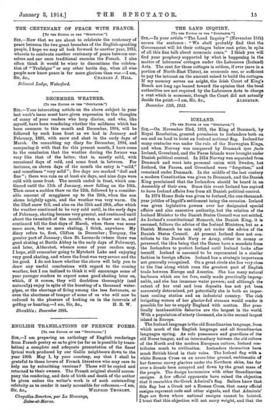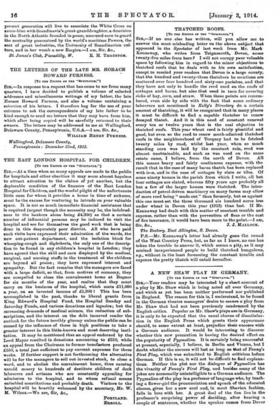ICELAND.
[To :sr Eorros or las "Srscrarox."1
SI11,-031 November 23rd, 1913, the King of Denmark, by Royal Resolution, granted permission to Icelanders both on sea and on land to hoist an Iceland national flag. Iceland for many centuries was under the rule of the Norwegian Kings, and when Norway was conquered by Denmark ipso facto Iceland, Greenland, and the Faroe Islands were brought under Danish political control. In 1814 Norway was separated from Denmark and went into personal union with Sweden, but Iceland, the Farces, and Greenland were "forgotten," and remained under Denmark. In the middle of the last century a modern Constitution was given to Denmark, and the Danish King proclaimed that the Icelanders should be heard in an Assembly of their own. Since this event Iceland has aspired to have Iceland affairs free from all Danish political controL
In 1874 Home Rule was given to Iceland, the one-thousand- year jubilee of Ingolf's settlement being the occasion. Iceland was given legislative powers over her designated special affairs and also executive authority, but the relation of the Iceland Minister to the Danish States Council was not settled. As Iceland's constitutional Monarch, the Danish King, it is assumed, follows the advice of the Iceland Ministers, but as a Danish Monarch he can only act under the advice of the Danish States CounciL At present Iceland does not con- tribute to the Danish Navy or Army, either in money or personnel, the idea being that the Danes have a mandate from the Icelanders to protect Iceland until Iceland looks after herself. Iceland is assumed to be represented in a similar fashion in foreign affairs. Iceland has a strategic importance not generally recognized. On a great circle she lies very close to the line along which runs the greatest part of English trade between Europe and America. She has many natural, harbours which are ice free, easily made practically impreg- nable, and she has immense water powers; and although the extent of her coal and iron deposits has not yet been accurately determined, yet potentially she is both an impel, tent coaling station and an industrial country. The rich irrigating waters of her glacier-fed streams would render it possible for her to supply England with mutton. Her prac- tically inexhaustible fisheries are the largest in the world. With a population of ninety thousand, she is the second largest island in Europe.
The Iceland language is the old Scandinavian language, from which much of the English language and all Scandinavian languages spring. As sole possessors and guardians of the old Norse tongue, and as intermediary between the old culture of the North and the modern European culture, Iceland con- tributes much to civilization. Icelanders themselves have much British blood in their veins. The Iceland flag with • white Roman Cross on an azure-blue ground, emblematic of her famous snowy glaciers under the Northern skies, has for over a decade been accepted and flown by the great mass of the people. The design harmonizes with other Scandinavian ensigns. A few official opponents have raised the objection that it resembles the Greek Admiral's flag. Sailors know that this flag has a Greek not a Roman Cross, that many official ensigns represent code and other signals, and that Admirals' flags are flown where national ensigns cannot be hoisted. I trust that this objection will not carry weight, and that the
present generation will live to associate the White Cross on azure-blue with Scandinavia's great-granddaughter, a dominion in the North Atlantic founded in peace, unarmed save to guard the neutrality guaranteed by the world's maritime Powers, the seat of great industries, the University of Scandinavian cul- ture, and in her womb a new Empire.—I am. Sir, dm, St. James's Club, Piccadilly, W. E. H. Tnatismow.



















































 Previous page
Previous page